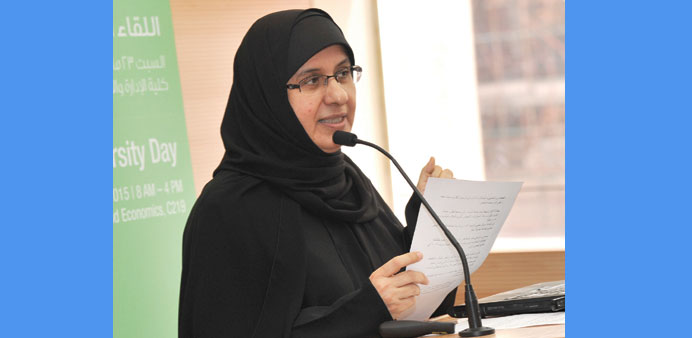Qatar University (QU)’s College of Education (CED) is carrying out several initiatives that aim to shape the future generation of teaching professionals and education leaders who will contribute to Qatar’s growth and development.
The college has a strong focus on the development of education at university level as well as at K-12, which is in line with QU’s efforts to promote high-quality education at various stages and ensure its students’ competitiveness for the fast-growing labour market.
Led by dean Dr Hissa Mohamed Sadiq, CED has been committed to educational enhancement and towards providing Qatari society with continuous professional development by supporting scholarly activities as well as fostering teachers’ professional development and life-long learning through its National Centre for Educator Development and the Training Centre for Early Childhood Teachers, according to a statement.
Dr Hissa pointed to the core role of the training centre in boosting the capabilities and skills of early childhood teachers. “It contributes to enhancing the quality of academic programmes offered by the college, developing related research and offering training courses and workshops as well as educational and psychological counselling to parents,” she said.
Further, Dr Hissa highlighted that the college is engaging the community and high-school students through a number of activities, events and workshops that reflect its mission focused on learning as a community responsibility and on student-centred education.
The college recently held, in conjunction with the Supreme Education Council, a conference on Education 2015 “Partners in Education”, aiming to provide an international forum to present and debate challenges, innovations and practical solutions adopted in the field of education.
She also pointed out that CED is organising a number of volunteering activities that serve first-grade students at independent schools, such as “Reading Together for Qatar”, an activity designed to enhance students’ reading skills and capabilities, and provide them with the literacy tools that will help them build strong learning skills.
The programme engaged a number of Independent schools in Doha with each student being followed by a volunteer whose role was to identify, through specific strategies and criteria proposed by experts, the types of difficulties the student faced with Arabic language materials. A therapeutic programme was also established to solve reading issues and improve students’ reading skills and abilities.
She noted that the college continues to showcase its capacity to address issues that reflect on the national priorities on education reform. “It serves as a significant link between the government, the education sector and society in engaging dialogue on timely issues such as the inclusion of persons with disabilities in all areas of society,” Dr Hissa said.
This was reflected in a seminar hosted by the college’s Department of Psychological Sciences in support of World Autism Awareness Day, and in partnership with Shafallah Centre for Children with Special Needs and the Intellectual Disability and Autism Programme at the Arabian Gulf University.

Dr Hissa Mohamed Sadiq
